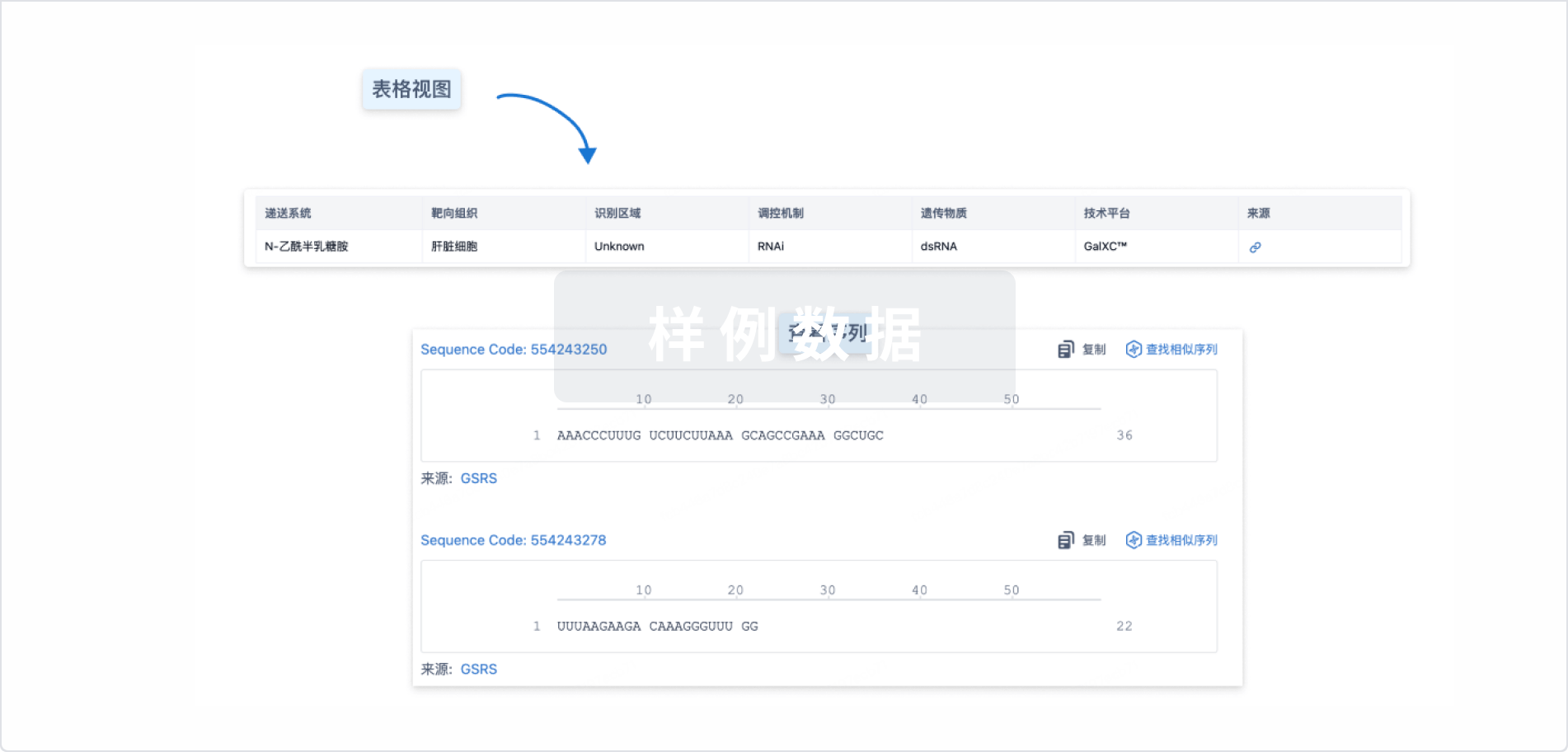预约演示
更新于:2025-05-07
HBsAg(Zhejiang la figure parker pharmaceutical)
幽门螺杆菌疫苗
更新于:2025-05-07
概要
基本信息
原研机构 |
在研机构 |
非在研机构- |
权益机构- |
最高研发阶段临床前 |
首次获批日期- |
最高研发阶段(中国)- |
特殊审评- |
结构/序列
使用我们的RNA技术数据为新药研发加速。
登录
或

关联
100 项与 幽门螺杆菌疫苗 相关的临床结果
登录后查看更多信息
100 项与 幽门螺杆菌疫苗 相关的转化医学
登录后查看更多信息
100 项与 幽门螺杆菌疫苗 相关的专利(医药)
登录后查看更多信息
89
项与 幽门螺杆菌疫苗 相关的文献(医药)2022-06-01·Asian Pacific Journal of Cancer Prevention
Frequency of Hepatitis B Markers in Systemic Lupus Erythematosus Patients in Iran
Article
作者: Noormandi Pour, Sedigheh ; Rajaee, Elham ; Biparva Haghighi, Somayeh ; Shokri, Somaya ; Teimoori, Ali ; Makvandi, Manoochehr ; Mahmoudvand, Shahab
2022-05-01·Journal of Family Medicine and Primary Care
Prevalence of hepatitis B and C virus infections and immunity among hemodialysis patients in the Mazandaran province, Northern Iran
Article
作者: Moghaddam, Kasra Ahmadi ; Ebrahimi, Ata ; Darrudi, Amin ; Roozbeh, Fatemeh ; Nava, Melody Omrani ; Ghaffari, Kosar
2021-07-01·International Immunopharmacology2区 · 医学
Formulation of HBsAg in Montanide ISA 51VG adjuvant: Immunogenicity study and monitoring long-lived humoral immune responses
2区 · 医学
Article
作者: Ghahari, Seyed Mohammad Mahdi ; Asgarhalvaei, Fatemeh ; Savoji, Mohammad Ali ; Mahdavi, Mehdi ; Sereshgi, Mohammad Mehdi Adibzadeh
4
项与 幽门螺杆菌疫苗 相关的新闻(医药)2024-12-25
·欧林生物
近日,四川省医药行业协会发布了《关于发布2023年度四川医药企业 50强的公告》,成都欧林生物科技股份有限公司(以下简称“欧林生物”、“公司”)凭借雄厚实力荣耀登榜,在四川医药领域崭露头角。
图1 2023年度四川医药企业50强名单截图(部分)
自成立十余年来,欧林生物砥砺奋进,建成近9万平方米的研发生产基地,打造了完善的生产和质量管理体系,建立了覆盖全国的销售网络,实现3个产品上市销售。其中,吸附破伤风疫苗在国内市场的占有率超85%,连续六年市场占有率行业第一。
创新驱动发展,公司坚守初心,深耕技术创新与产品研发前沿阵地,构建了“阶梯有序、重点突破、多产品储备”的研发格局。公司专注于“超级细菌”的预防研究,是国内独家布局“超级细菌”系列疫苗的疫苗企业,产品一旦上市,有望填补世界空白。目前,公司全球1.1类新药重组金葡菌疫苗正在开展Ⅲ期临床试验,期中分析结果显示试验结果符合预期,进展全球领先。此外,公司有幽门螺杆菌疫苗、鲍曼不动杆菌疫苗、铜绿假单胞菌疫苗等多个全球原创新药稳步在研,未来可期。此次成功入选四川医药企业50强,既是对欧林生物过往业绩的肯定,更为前行之路吹响号角。展望未来,欧林生物将以此为契机,乘势而上,不断为研发引擎添柴加薪,攻坚前沿技术,加速创新成果落地转化。同步坚定推行“走出去”“引进来”的双向国际化发展战略,加速产品出海布局,实现全球销售;此外,广纳全球前沿成果,将优质的产品引入中国,惠及本土民众,向着“健康中国”的宏伟目标大步迈进,用实干担当为全民健康保驾护航。
图2 欧林生物鸟瞰图
临床3期疫苗
2024-03-11
近日,国际学术期刊Journal of Virology在线发表病毒学国家重点实验室/武汉大学生命科学学院朱应研究组的最新研究成果,论文题目为An intranasal influenza virus vector vaccine protects against Helicobacter pylori in mice(《鼻喷流感病毒载体疫苗在小鼠中可提供抗幽门螺杆菌感染保护作用》)。该研究首次揭示了鼻喷免疫流感病毒载体疫苗在小鼠对抗幽门螺杆菌感染中发挥的重要作用,此设计思路可能为今后开发针对幽门螺杆菌感染的新型疫苗提供参考并助力人类对抗幽门螺杆菌的反复感染。研究背景幽门螺杆菌(Helicobacter pylori)是一种感染了全球近一半人口的螺旋状微需氧革兰氏阴性菌。近些年,幽门螺杆菌对抗生素耐药性的增加持续威胁着人类的健康,这也加大了社会对治疗幽门螺杆菌感染的新药以及预防性和治疗性疫苗的需求。由于上皮屏障、粘膜佐剂的潜在肠毒性以及胃环境的恶劣条件,传统的口服亚单位幽门螺杆菌疫苗研究面临着巨大的挑战。截止目前,尚无研究证明病毒载体疫苗在预防和治疗幽门螺杆菌感染中的作用。病毒学国家重点实验室朱应研究组对流感病毒基因组进行改造,并通过流感病毒反向遗传学系统成功拯救出可以稳定表达幽门螺杆菌中性粒细胞激活蛋白(NapA)的两种不同骨架的重组流感病毒。研究结果细胞水平和动物水平实验显示,这些重组流感病毒具有高度减毒和稳定遗传的特性。动物免疫实验显示,初免-加强免疫重组流感病毒可以在小鼠体内诱导抗原特异性的体液免疫、粘膜免疫以及Th1和Th17细胞免疫应答,这显示重组流感病毒具备良好的免疫原性。免疫后的攻毒实验显示,免疫重组流感病毒可以在诱导相关免疫反应的同时,降低小鼠胃中幽门螺杆菌载量和胃部炎症水平。此外,对已感染幽门螺杆菌的小鼠免疫重组流感病毒仍然可以在诱导相关免疫反应的同时降低小鼠胃中幽门螺杆菌载量和胃部炎症水平。这一系列实验显示,重组流感病毒载体疫苗除了可作为保护性疫苗使用外,同时具备成为治疗性疫苗的潜力。本研究首次揭示了流感病毒载体疫苗在小鼠中可提供抗幽门螺杆菌感染保护和治疗作用并且具备进行相关转化研究的潜力。重组流感病毒免疫后提供抗幽门螺杆菌感染保护作用的模式图。图片来源:J Virol.武汉大学生命科学学院聂龙宇博士为该论文的第一作者,朱应教授为该论文的通讯作者。刘实教授、黄玙博士和程智逵博士为本研究工作提供了众多帮助。本工作得到了国家重点研发计划(2021YFC2701800,2021YFC2701804)、国家自然科学基金(U22A20335, 81971494)等项目的资助。来源:病毒学国家重点实验室识别微信二维码,添加生物制品圈小编,符合条件者即可加入生物制品微信群!请注明:姓名+研究方向!版权声明本公众号所有转载文章系出于传递更多信息之目的,且明确注明来源和作者,不希望被转载的媒体或个人可与我们联系(cbplib@163.com),我们将立即进行删除处理。所有文章仅代表作者观点,不代表本站立场。
疫苗信使RNA
2023-08-05
邀请辞 近年来,我国生物医药产业全面对标世界先进国家和地区,研发投入持续加大,创新实力稳步增强。为促进生物医药科技创新和产业融合,进一步推动生物医药新兴技术与药品监管科学的发展,聚焦当下药物质量评价技术热点,由中国食品药品企业质量安全促进会、中国食药促进会疫苗及生物制品质量评价与标准专业委员会、国家药监局疫苗及生物制品质量监测与评价重点实验室、广州华银康医疗集团股份有限公司、佰傲谷BioValley联合主办的“首届中国食品药品医疗器械化妆品高质量发展大会—新型疫苗及生物制品发展高层论坛”将于 2023 年 8月 18 至 20 日在北京召开。 本次论坛以“真抓实干推动新型疫苗及生物制品高质量发展” 为主题,旨在汇聚生物医药领域的专家学者和青年才俊,以“新方法、新工具、新标准” 为突破口,共享生物医药研发与评价最前沿趋势及临床应用探索,同心协力加速共推生物医药产业高质量发展。8月18日-20日同期大会:首届中国食品药品医疗器械化妆品高质量发展大会大咖云集(上下滑动查看更多)▽毛振宾国家药品监督管理局科技和国际合作司原一级巡视员/中国食品药品企业质量安全促进会侯选会长毛振宾,中共党员、博士研究生,教授中国食品药品企业质量安全促进会会长(候选人)曾任:国家药品监督管理局科技和国际合作司 一级巡视员国家市场监管总局科技和标准司主要负责人(巡视员)国家食品药品监督管理总局 应急管理司 司长 国家食品药品监督管理总局执法稽查局 局长 国家食品药品监督管理局食品安全监管司司长国家食品药品监督管理局投诉举报中心主任国家食品药品监督管理局食品安全监察司 稽查专员▽卢洪洲深圳市第三人民医院院长、党委副书记、国家感染性疾病临床医学研究中心主任/主任医师主任医师、二级教授、内科学博士、留美博士后;内科学博士生导师、护理学博士生导师、公共卫生管理博士生导师、博士后流动站站长。荣获教育部长江学者、国家百千万人才工程、享受国务院特殊津贴、“有突出贡献中青年专家”、美国微生物科学院院士、美国管理技术大学特聘教授。深圳市首届疫情防控公共卫生专家组组长。入选美国斯坦福大学2021全球前2%顶尖科学家榜单(World’s Top2% Scientists 2021)及《终身科学影响力排行榜》。▽国家药品监督管理局药品审评中心▽中国食品药品检定研究院生物制品检定所▽王华庆中国疾病预防控制中心 主任医师▷演讲主题:疫苗上市后有效性、安全性监测与评价的思考主任医师、博士生导师、中国疾病预防控制中心免疫规划首席专家。主要研究领域为疫苗针对疾病的监测与防控、疫苗效果评价、疫苗不良反应监测等。目前,担任中华预防医学会疫苗与免疫分会主任委员、中国疫苗行业协会预防接种专委会主任委员。▽朱凤才江苏省疾病预防控制中心 副主任▽回爱民惠正奇医药/EnCureGen Pharma创始人、董事长兼CEO▷演讲主题:mRNA医学的挑战和未来前复星医药执行总裁,科学委员会主任,全球研发总裁兼CMO。复星全球合伙人。曾任赛诺菲全球副总裁。兼上海市干细胞治疗重点实验室主任,中国生物医药产业创新与转化联盟副会长,中国药促会肿瘤委员会副主任,第5届中国肿瘤大会学术委员会副主任。在美国直接领导了Ixazomib,Isatuximab等多个小分子及生物抗癌药的全球研发上市。主导了伊莎咗咪,阿伐曲珀帕等多款创新药在中国的研发上市。2017-2022年主导了复星医药研发转型,深化及国际化。与BioNTech合作,深度参与了人类历史上第一款mRNA产品(新冠疫苗)的研发,并主导了该疫苗(复必泰)在大中华区的研发及港澳台上市,带动了我国mRNA产业发展。第四届转化医学-国际合作奖,药物创新济世奖-2020十大药物创新科学家,国际消化道癌青年研究者奖等奖20余。论文100余篇包括新英格兰医学杂志,自然医学,柳叶刀,细胞癌症等。中英日文专著8部。▽李新旭博济医药 首席统计学家▷演讲主题:疫苗临床试验设计的统计学考虑中国疾控中心流行病与卫生统计学专业博士,国家药监局(NMPA)发布的ICH《E9(R1):临床试验中的估计目标与敏感性分析》专家工作组成员。加入博济医药前,曾担任中国疾控中心(CDC)副研究员,主要从事结核病等传染病防控工作,曾担任原国家卫生计生委-盖茨基金会结核病项目副主管。此后赴任国家药监局药审中心(CDE)研究员、统计学专业主审审评员,负责了500个药物注册上市申请的统计学专业审评工作。2023年1月至今,担任博济医药首席统计学家和数据总经理。▽梁晓峰暨南大学 讲席教授、暨南大学康泰生物疫苗产业研究院/疾病预防控制研究院 院长▷演讲主题:西太平洋地区免疫规划进展主任医师,1984年本科毕业于山西医科大学公共卫生系,1996年硕士毕业于北京协和医科大学公共卫生学院。曾在甘肃省卫生厅卫生防疫处工作15年,期间就任甘肃省卫生防疫站副站长,并于1996年-1998年在美国迈阿密大学进修结核病艾滋病防控2年。2000年调为中国疾控中心任免疫规划中心主任,2011任中国疾控中心副主任。2019年任中华预防医学会常务副会长兼任秘书长(正司局级),2021年5月调入暨南大学任暨南大学-康泰生物疫苗产业研究院院长,为暨南大学首个讲席教授。▽陆家海中山大学教授、博士生导师,国家药监局疫苗及生物制品质量监测与评价重点实验室主任▷演讲主题:监管科学推动疫苗创新教授、博士生导师,具有流行病学、疫苗学、病原生物学和动物医学等多学科交叉教育背景。国家药品监督管理局疫苗及生物制品质量监测与评价重点实验室主任、海南医学院同一健康中心主任,One Health Bulletin主编、纽约州立大学和澳大利亚埃迪斯科文大学客座教授,长期从事新发传染病防控关键技术研究。发表学术论文400余篇,主译、主编、参编专著和教材10余部,获得省部级科技进步二等奖2项,三等奖3项,获发明专利10余项,曾荣立军队三等功一次和抗击非典先进个人等。▽陈泽良中山大学研究员/俄罗斯工程院外籍院士▷演讲主题:纳米颗粒支架及其在疫苗中的应用研究辽宁省人兽共患病研究重点实验室副主任,中山大学公共卫生学院特聘教授、博士生导师,入选省级高层次人才计划,俄罗斯工程院外籍院士。博士毕业于军事医学科学院,先后任军事医学科学院疾病预防控制所助理研究员、副研究员及研究员、解放军公共卫生应急处置大队侦检队队长、军事医学科学院疾病预防控制所传染病控制中心副主任、天康生物股份有限公司研发中心创新团队首席专家。主持国家重点研发计划项目课题、国家863专题、国家自然科学基金重点项目、传染病重大专项子任务课题等科研项目10余项,先后发表SCI论文90余篇,授权专利10项,获批新兽药证书1项,诊断产品CE证书10项。▽夏宁邵厦门大学 主任/教授▷演讲主题:创新疫苗研究和转化夏宁邵,教授,现任厦门大学国家传染病诊断试剂与疫苗工程技术研究中心主任、传染病疫苗研发全国重点实验室主任,入选中国医学科学院学部委员、国家杰青、长江特岗学者;主持研制上市全球首个戊肝疫苗、首个国产HPV疫苗、全球首个鼻喷流感病毒载体新冠疫苗;在《新英格兰医学杂志》《柳叶刀》《柳叶刀·呼吸医学》《柳叶刀·传染病》《科学·转化医学》《自然·微生物学》《细胞·宿主与微生物》等高水平期刊发表论文70余篇;近九年连续入选爱思唯尔中国高被引学者,两次入选《自然·生物技术》全球转化研究者TOP20榜单;获国家技术发明二等奖、国家科技进步二等奖。▽李奎华银康集团 转化医学研究院院长▷演讲主题:新冠患者免疫多组学分析南方医科大学工程硕士导师、广州开发区精英人才、广州市高新技术企业协会生物医药行业专委会专家、广东省科技评审专家、广州市科技专家库评审专家、广州市智慧医疗产学研技术创新联盟理事、广东省药学会第十届制药工程专业委员会委员。主持并参与2020年广东省重点领域研发计划“重点科技产业质量基础共性技术研究及应用”重点专项、国家重大专项“hTERTC27多肽基因病毒疫苗抗癌治疗研究”等重大项目12项,发表论文11篇,申请专利102项。师从孔祥复院士参与基因治疗研究;曾任国家“863”生物病毒载体产业化基地基因治疗药物开发项目负责人,负责基因药物药效、质量、生产工艺和安全性试验等研究,IND申请2项:溶瘤腺病毒(SG600-P53),AAV-TNF;美国sequenom公司和程京院士主持的国家基因芯片工程中心下属企业广东博奥检验开展分子诊断相关工作,具有10年新药开发和10年精准诊断从业经验。▽邹全明陆军军医大学国家免疫生物制品工程技术研究中心 主任/教授▷演讲主题:原创超级耐药细菌疫苗研究实践及面临的挑战国务院学位委员会药学学科评议组成员,国家药典委员会委员。30年从事原创生物制药与疫苗研发、超级耐药细菌感染与免疫机制研究。领衔创立“靶向佐剂黏膜疫苗”设计原理及关键技术,成功研制国际首个幽门螺杆菌疫苗,获原创1.1类新药证书;主持创建“细菌功能靶标组合疫苗”技术体系,发明国际首个五组分金黄色葡萄球菌疫苗,并开展Ⅲ期临床试验。发表SCI论文147篇,以第一发明人获国家发明专利授权32项,国际发明专利授权8项;第一署名获国家技术发明二等奖、国家科技计划执行突出贡献奖、重庆市技术发明喝自然科学一等奖,立二等功1次。▽戴连攀 中国科学院微生物研究所 研究员▷演讲主题:新冠疫苗的设计,临床与免疫国家优青基金获得者,中国科学院微生物所研究员,研究组长,博士生导师;德国慕尼黑工业大学(TUM)博士;长期从事重要病原的新型疫苗的设计与开发、以及保护性免疫应答机制研究,在针对新型冠状病毒、寨卡病毒等重大传染病疫苗研究与开发中取得重要研究和转化成果,其中新冠蛋白亚单位疫苗获包括我国在内的多国批准使用。成果以第一/通讯作者身份在Cell, The New England Journal of Medicine, Nature Immunology,Nature Reviews Immunology等杂志发表,多项发明专利获得授权。是中源协和生命医学创新突破奖、中国免疫学会青年学者奖、中科院创新促进会优秀会员获得者。▽吴克博沃生物 创始人兼CEO▷演讲主题:开发理想的HPV疫苗湖北省政府特聘产业教授,免疫学博士,中国疫苗行业协会糖疫苗专委会副主委。30年以上行业经验,具有欧美留学深造经历,是中欧国际工商学院和长江商学院校友。曾任中华预防医学会生物制品委员会委员、中国微生物学会医学微生物学会委员、湖北省免疫学会常务理事以及武汉市政协委员等职。曾在卫生部武汉生物制品研究所任研究生导师、细胞工程研究室主任、科研处处长等职;主持过国家863项目、“重大新药创制”专项在内的多个项目开发,带领团队当选首届和第二届“湖北省自主创业战略团队”。2020年获评德勤”中国明日之星”称号,是唯一获奖疫苗企业。▽莘春林康希诺生物 副总裁/正高级研究员▷演讲主题:新冠病毒黏膜免疫疫苗开发毕业于南开大学和中国疾病预防控制中心病毒研究所,现担任康希诺生物股份公司副总裁,主导对外技术合作和科学事务的相关工作。曾在诺华中国担任肿瘤转化医学生物标志物技术的负责人,曾担任加拿大国家研究院的技术官以及默克加拿大研究院的高级科学家。2017年加入康希诺生物股份公司,负责新一代疫苗的设计和开发,以及新技术平台的探索和建立。在新冠疫情爆发时,参与并领导了腺病毒载体新冠疫苗的研发工作,此项研究获得了国家专利金奖,并在中国以及其他12个国家获得了紧急使用许可,同时也得到了世界卫生组织的国际认证。▽刘超Pi Health联合创始人&首席财务官/百济神州应用创新高级总监▷演讲主题:助力中美双报:探索建立中国创新药走向国际的数字纽带2019年加入百济神州应用创新团队,主要负责肿瘤创新药竞争情报信息中心开发,并对应用创新核心产品进行市场评估、收入预测和实时估值。在此期间,作为创始团队成员参与创立了Pi Health,负责公司的资本管理、财务决策和战略规划,同时兼任中国业务负责人,全面负责该公司在中国的部门创建、日常运营和业务拓展。2014年至2019年在美国食品和药物管理局(FDA)工作,负责创新药评审。曾担任定量药理评审组组长,重点负责肿瘤学、血液学、心血管疾病和传染病领域。在FDA期间,与评审团队参与评审了上百个IND研发申请和数十个NDA/BLA上市申请,其中包括首两个CAR-T细胞疗法(Kymriah和Yescarta)的FDA上市申请。此外,还参与多个FDA指导方案的起草与发布。▽秦成峰军事医学研究院 研究员/微生物流行病研究所病毒学研究室主任▷演讲主题:mRNA技术对抗大流行:从疫苗到抗体军事医学研究院微生物流行病研究所研究员,博士生导师。主要从事病毒学、疫苗学研究。以通讯作者在Cell、Nature、Science等国际期刊发表论文200余篇,累计被引超过26,000次,连续入选科睿唯安“全球高被引科学家”、爱思唯尔“中国高被引科学家”。领衔获得北京市自然科学一等奖和军队科技进步一等奖各1项,授权发明专利26件,获批临床试验批件和军特药批件多项。曾获中国青年科技奖、求是杰出青年奖、吴阶平-保罗杨森医学药学奖、谈家桢生命科学创新奖、树兰医学青年奖、转化医学创新奖、药明康德生命化学奖(杰出成就奖)、牛顿高级学者等。▽向双林远泰生物 教授▷演讲主题:mRNA-LNP技术在免疫预防与免疫治疗方面的应用研究华西医科大学医学硕士,日本金泽大学医学博士,美国哈佛医学院博士后、讲师,湖南师范大学二级教授、博士生导师;湖南省“芙蓉学者”计划特聘教授,教育部“新世纪优秀人才”。在Nature Biotechnology等国际学术刊物上发表SCI论文、出版英文专著章节文章70余篇,获专利授权7项;主持或参与国家级、省部级科研课题15项。生物治疗领域专家,“跨界基因沉默”技术的发明人。曾任湖南师范大学生命科学学院院长,南华生物医药股份有限公司董事总经理、董事长;现任湖南远泰生物董事长,中国细胞生物学会细胞结构与功能分会委员、常务理事,湖南省生物化学与分子生物学学会副理事长,湖南省实验动物学会副理事长。▽李航文斯微生物 董事长兼首席执行官▷演讲主题:肿瘤mRNA疫苗研发策略和临床探索研究博士毕业于M.D Anderson癌症中心,曾任M.D Anderson癌症中心药理及临床治疗系助理教授,连续获得美国国防部的项目资助和奖项。现任同济大学东方医院特聘研究员、中国疫苗行业协会疫苗国际合作促进分会委员和中国疫苗协会核酸疫苗分会常任理事。20年以上RNA 及癌症免疫治疗领域的经验,研究领域包括肿瘤免疫治疗,RNA 药物及癌症干细胞等,先后发表30 余篇SCI文章及著作。2021年获得全国科技系统抗击新冠肺炎疫情先进个人,2022年荣获“科创投”杯海聚英才全球创新创业大赛-金聚奖。▽栗世铀启辰生生物 联合创始人兼CTO▷演讲主题:新型肿瘤mRNA治疗性疫苗设计策略及临床探索曾任中国科学院北京基因组研究所研究生导师、主持科技部创新2020疫苗项目、国家十三五传染病重大专项首席科学家;参加十一五重大药物研发专项、承担十二五、十三五 “重大新药”创制项目;在研多项科技部和地方科委课题。国家和浙江、福建等省自然科学基金委评审专家;多个杂志编委;发表SCI论文60余篇。协办单位*协办单位名单:【上下滑动查看更多】赞助单位广州华银医学研究所有限公司湖州申科生物技术股份有限公司亘信科技(广东)有限公司浙江泰林医学工程有限公司上海烈冰生物医药科技有限公司上海优宁维生物科技股份有限公司精智未来(广州)智能科技有限公司北京映急医药冷链科技有限公司英格尔医药科技(上海)有限公司浙江恒驭生物科技有限公司上海羽冠生物技术有限公司北京达科为生物技术有限公司参会报名生物技术、药企、疫苗、科研院校和监管机构人员限时免费注册(人数限制,先注册先得)本次报名为预登记报名,组委会审核通过后,您将收到邮件通知!扫码报名(限时免费)▽联系我们定制参展/商务赞助/媒体合作/参会报名请联系:Emily 13162015900(微信同号)【备注:新型疫苗,进入大会交流群】同期论坛:细胞医药高质量发展论坛大会议程抢先一览(上下滑动查看更多)点击”阅读原文“,进入大会官网了解更多~
疫苗一致性评价
100 项与 幽门螺杆菌疫苗 相关的药物交易
登录后查看更多信息
研发状态
10 条进展最快的记录, 后查看更多信息
登录
| 适应症 | 最高研发状态 | 国家/地区 | 公司 | 日期 |
|---|---|---|---|---|
| 病毒性肝炎 | 临床前 | 美国 | 2023-05-22 |
登录后查看更多信息
临床结果
临床结果
适应症
分期
评价
查看全部结果
| 研究 | 分期 | 人群特征 | 评价人数 | 分组 | 结果 | 评价 | 发布日期 |
|---|
No Data | |||||||
登录后查看更多信息
转化医学
使用我们的转化医学数据加速您的研究。
登录
或

药物交易
使用我们的药物交易数据加速您的研究。
登录
或

核心专利
使用我们的核心专利数据促进您的研究。
登录
或

临床分析
紧跟全球注册中心的最新临床试验。
登录
或

批准
利用最新的监管批准信息加速您的研究。
登录
或

特殊审评
只需点击几下即可了解关键药物信息。
登录
或

生物医药百科问答
全新生物医药AI Agent 覆盖科研全链路,让突破性发现快人一步
立即开始免费试用!
智慧芽新药情报库是智慧芽专为生命科学人士构建的基于AI的创新药情报平台,助您全方位提升您的研发与决策效率。
立即开始数据试用!
智慧芽新药库数据也通过智慧芽数据服务平台,以API或者数据包形式对外开放,助您更加充分利用智慧芽新药情报信息。
生物序列数据库
生物药研发创新
免费使用
化学结构数据库
小分子化药研发创新
免费使用
